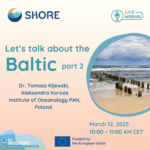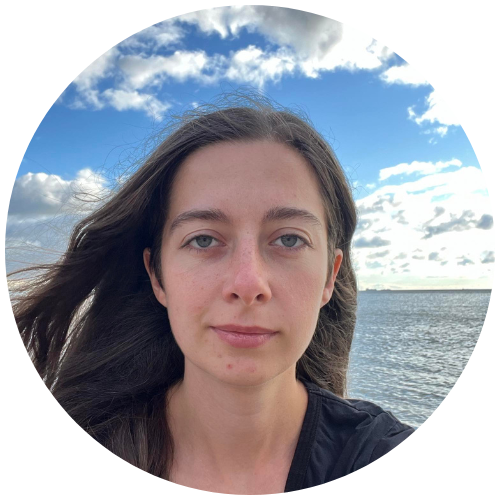
Join us for the second Let’s Talk About Baltic webinar: “Secrets of the Baltic Sea’s Biodiversity and the Extraordinary Life of Migratory Fish.”
Is the Baltic Sea rich in life? During this webinar, you’ll learn about the fascinating species inhabiting this unique ecosystem — from microscopic plankton to fish commonly found on our plates. We will explore the vital role of tiny, invisible organisms and how they impact the health of the sea and its larger inhabitants.
In the second part, we will dive into the incredible journeys of salmon and sea trout, which leave the salty waters of the Baltic to spawn in cold freshwater streams. Discover the challenges they face and the influence of human activities on these remarkable fish. We will also discuss farmed fish, their health benefits, and environmental risks.
Topics we’ll cover:
• What makes the biodiversity of the Baltic Sea unique compared to other seas?
• Are there any endemic species in the Baltic Sea?
• Can the loss of a single species disrupt the entire ecosystem?
• What conservation efforts are underway to protect Baltic biodiversity?
• The incredible journeys of salmon and sea trout – how do they manage it, and why does it matter?
• Farmed fish: health benefits, challenges, and risks
Why Join?
Gain fascinating insights into the Baltic Sea ecosystem, learn how we can protect its biodiversity, and discover practical knowledge on sustainable fish consumption.
Our Speakers:

Dr. Tomasz Kijewski, is a member of the Climate and Ocean Research and Education (CORE) Laboratory at the Institute of Oceanology of the Polish Academy of Sciences (IO PAN) in Sopot. Dr. Kijewski is a biologist specializing in marine fauna genetics. As a co-creator of the “Ocean of Changes” project (https://oceanofchanges.com), he is involved in educational activities, participating in or co-organizing numerous science festivals, picnics, workshops, and lectures for youth and adults. Tomasz is part of the team editing and producing the “Ocean Handbook” series of films and is the author of numerous scientific and popular science publications, as well as the author of the blog www.rybanapiatek.wordpress.com. (in polish).
Aleksandra Koroza, is a researcher at the Laboratory for Climate and Ocean Education and Research at the Institute of Oceanology of the Polish Academy of Sciences (IOPAN). She focuses on marine ecosystem services and various studies conducted within the laboratory that combine social sciences with ocean and marine research. She is also passionate about exploring the impact of anthropogenic pollution on marine mammals. Aleksandra earned her master’s degree at Bangor University in Wales, where she studied the effects of maritime traffic on the behavior of bottlenose dolphins in New Quay. She is a member of the international OYSTER network and co-organizes scientific conferences for children and youth, such as the International Sopot Youth Conference.

Don’t miss this chance to delve into the mysteries of the Baltic Sea and discover how each of us can contribute to its preservation!
Register now and uncover the secrets of the Baltic!
📅 Date: March 12, 2025
⏰ Time: 10:00 – 11:00 AM CET
📍 Location: Online, Zoom Platform
💻 Registration Link: HERE
🎬 Curious about the first Let’s talk about the Baltic webinar? The recording is now available! Click the link and watch it whenever you want!
Webinar funded under SHORE project is a Mission Ocean and Waters project funded by the EU’s Horizon Europe research and innovation programme (Project number: 101112815).

